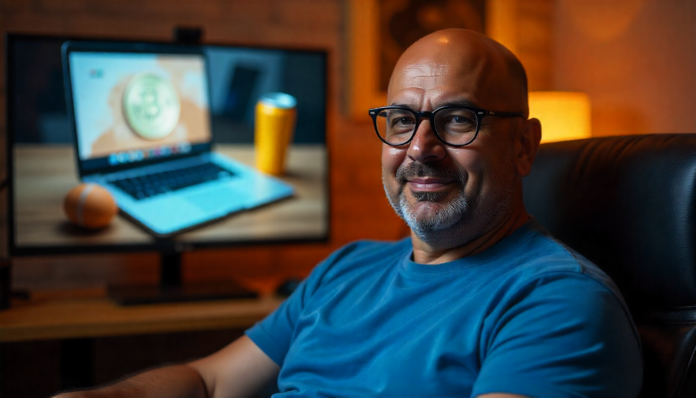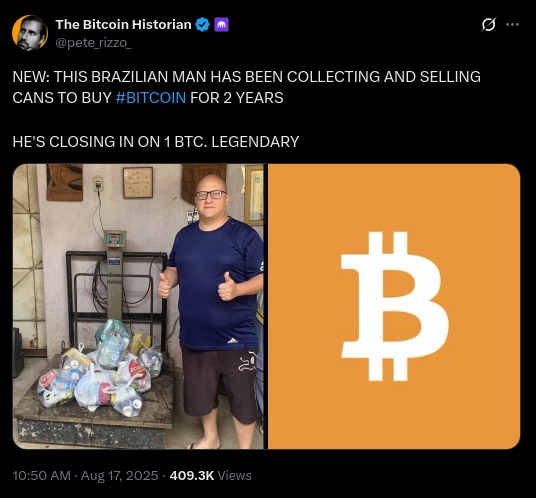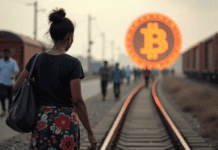
A Brazilian man has spent two years collecting cans to accumulate Bitcoin. His story, celebrated online, embodies financial inclusion, perseverance, and the transformative power of the digital economy.
In the city of Limeira, a corner of Brazil where economic informality coexists with the creativity of those seeking alternatives to the traditional system, a man has turned can recycling into a financial strategy. For two years, Bruno Oliveira has collected, sorted, and sold aluminum with a clear purpose: accumulate Bitcoin.
Today, according to Pete Rizzo, editor of Bitcoin Magazine, Oliveira is close to reaching 1 BTC, whose value exceeds $112.000, at the time of writing this article.
Oliveira's story has resonated on social media as a symbol of conviction, physical effort, and faith in a technology that promises inclusion. More than just an anecdote, this case raises profound questions about access, resilience, and the true meaning of "Proof of Work."
Every satoshi counts: buy BTC on Bit2MeA story of conviction and success
Oliveira, the protagonist of this story, has captured the attention of the crypto community for one powerful reason: has managed to accumulate almost 1 BTC by collecting cans on the streets of BrazilThis isn't a speculative strategy or a traditional investment. It's literally the result of physical labor converted into digital savings. Each can represents a fraction of effort, each sale an opportunity to turn waste into value. In a country where millions live in the informal economy, this story serves as a mirror to the possibilities that Bitcoin offers as a financial alternative.
Rizzo shared the case on social networks, highlighting that this individual is “about to reach 1 BTC”The figure is no small feat. In the current context, 1 BTC is worth over $112.000, making this feat a testament to perseverance and long-term vision, as well as the conviction that every satoshi accumulated could represent a form of financial sovereignty.

On social media, comments of amazement and recognition of her perseverance have been quick to appear. “Recycling Your Way to Financial Freedom”, wrote one user, celebrating the narrative of escape from the traditional banking system. Another commented: “Pure dedication and belief”, highlighting the value of maintaining faith in the innovative Bitcoin and cryptocurrency market.
Oliveira's story, far from being anecdotal, has become a symbol of what Bitcoin represents for those without access to conventional financial instruments.
Be like Bruno and start accumulating BTCBitcoin as a tool for inclusion
What makes this story resonate strongly in the crypto ecosystem is its direct connection to the concept of Proof of Work (PoW). In Bitcoin, PoW is the mechanism that validates transactions and secures the network. In this case, physical labor—collecting, transporting, and selling cans—becomes a living metaphor for that consensus. “Literally proof of work (PoW)”, wrote one user on X, highlighting the powerful irony of transforming aluminum into digital savings.
The narrative also touches a sensitive nerve: the democratization of access to finance. “Proof that anyone can own 1 BTC", commented X, stressing that you don't need a large initial capital or advanced technical knowledge to participate in the financial system established by Bitcoin, but rather will, perseverance and a clear strategy. In a world where the accumulation of wealth is often linked to structural privileges, this case shows that Bitcoin can be a empowerment tool for those who operate outside the formal system.
Recycling also has an ecological dimension that connects with emerging values within the crypto ecosystem. Although the protagonist's primary objective was financial, his activity also contributes to reducing urban waste. In that sense, his story fits into a broader narrative of sustainability, resilience and adaptation.
The crypto community has responded to the story with enthusiasm, but also with reflection. “True diamond hands begin with aluminum”, wrote one user, playing with the term “diamond hands” Used to describe those who don't sell their assets despite volatility. Here, the metaphor becomes literal: hands working with metal to sustain a digital conviction.
Bitcoin is for everyone: Create your free account hereBeyond the Case: Can Bitcoin Really Be a Way Out?
Oliveira's case raises a question that goes beyond the individual: Can Bitcoin be a real path to financial inclusion for those living in informal economies? In Brazil, as in many Latin American countries, millions of people operate outside the banking system. They lack access to credit, savings accounts, or investment instruments. But for them, Bitcoin is not a speculative venture, but a concrete alternative.
Therefore, Oliveira's story becomes a provocation. Not because of the amount accumulated, but because of the method. Instead of waiting for subsidies or relying on intermediaries, this individual chose a route that combines physical labor with digital savings. His strategy, although extreme, is replicable in other contexts, and that is what makes it powerful.
On social media, her story has been celebrated as an emblematic example of the movement called “Bitcoin for the unbanked.” This expression strongly captures a crucial idea, that the world's most recognized cryptocurrency can give financial sovereignty To those who have been forgotten by banks and traditional institutions. For Oliveira, owning almost a bitcoin has not only been an economic achievement, but also a political and social statement, a clear demonstration that anyone, regardless of location, can become part of the global digital economy.
But beyond monetary value, this story also speaks to the value of time and effort. In an age where speed and immediacy seem to dominate everything, Oliveira's case invites us to reflect on patience and genuine work as valuable paths to achieving sustainable results. Oliveira didn't just collect cans; with each step, he gathered hope, conviction, and a tangible form of freedom.
Bit2Me: your real access to the digital economy


